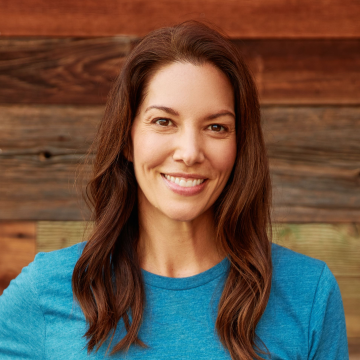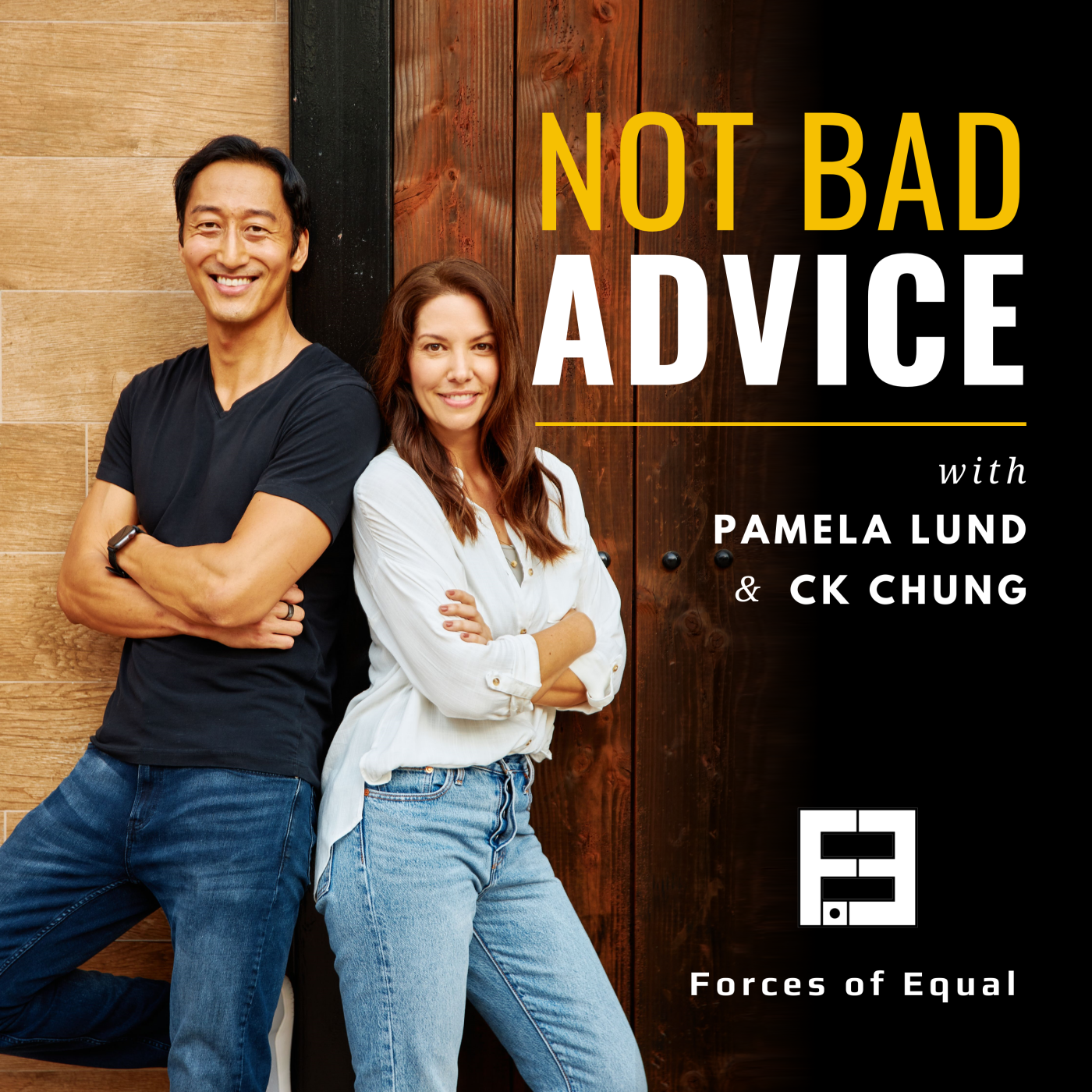What would you do with an extra $1500 every month? Your answer will give you insight into how to be happier with the money you have right now and how to stop should-ing all over your budget.
Ready to feel like you’re not bad with money? Visit NotBadWithMoney.com to learn about our financial coaching service that’s mostly practical and a little magical.
Got something you need advice about? Ask us here: ForcesOfEqual.com/Advice/
Transcript
Pam: [00:06] You’re listening to Not Bad Advice where our goal is to offer perspective that helps you one aspect of your life at a time.
[00:12] I’m Pamela Lund.
CK: [00:20] And I’m CK Chung.
Pam: [00:22] And we hope that after listening you’ll think, “Hey, that’s not bad advice!”
[00:26] A quick programming note before we dive in today, we are dedicating the next several episodes to money topics. We’ll go over everything from how to uncover the unconscious money stories that are sabotaging your goals to practical advice, like how to actually set up and use a budget that works for longer than a month.
[00:54] As with all of our episodes, the advice you hear can be used on its own. But if you’re ready for more, we’re also announcing our newest coaching service: Not Bad With Money – a one-on-one personalized money and budget coaching program designed to heal your relationship with money, so you can feel calmly in control of how it flows through your life.
[01:12] Visit NotBadWithMoney.com or the link in the show notes if you’re ready to feel like you’re not bad with money.
[01:17] Last week, we talked about developing awareness about what money means to you. So you can start aligning your decisions with your goals and be aware of how you may be sabotaging yourself unconsciously. This week, we’re going to build on that concept by digging into financial values. If you haven’t listened to the episode on what money means to you, you don’t need to before listening to this one, but don’t forget to go back and check it out.
[01:45] So let’s talk about financial values. We’re not talking about financial value. This isn’t about your net worth. It’s about what you deem important and meaningful financial values are based on what we value in life and what guide our financial decisions. Even if we don’t realize it. You can have a financial value and make decisions based on it without knowing you have that value at all.
[02:10] And if you don’t know what your financial values are, you may set goals that you will never achieve because the goals don’t align with your values, so you won’t commit to them. Then, you’ll feel like a failure and develop a story that you’re bad with money, all because your goals are based on false pretenses.
[02:27] So before you even get to setting financial goals, you want to discover your underlying financial values to set yourself up for success.
[02:36] First, let’s talk about what financial values aren’t. Financial values are not your goals. Your goals are based on your values, but goals need to be specific and measurable. Whereas values are more of a concept.
[02:50] Financial values are not your bills and other priorities. You have to pay your utility bill, even if you don’t feel like it aligns with your values. You might use your values to find a way to reduce your utility bill by choosing greener alternatives, but that’s a whole other topic.
[03:06] And finally, financial values are not what money means to you, which we discovered in our last episode. These are related concepts, but they can work together or conflict.
[03:16] For example, money can mean security to you, while you value having a large home, which could create conflict between your desire to save money and your deep need for a home that comes with a bigger mortgage. Knowing where these conflicts are, will make your relationship to money flow more smoothly.
[03:35] Now, let’s talk about what financial values are or could be for you. Pretend that you have no debt and that you’re going to get an extra $1,500 each month above and beyond what you need to pay your bills and cover your other priorities.
[03:50] This is totally free money that you can do whatever you want with. Now, at first you might go and buy a bunch of things that you’ve been wanting, but couldn’t afford or couldn’t justify buying. But after that initial excitement wears off, what would you do with that money? There are no wrong answers and you can think of multiple things. You don’t have to spend it all on one thing.
[04:11] So think about a year in to getting this extra $1,500 every month. What do you see yourself using that money for? The things that you’re thinking about are likely indicative of your financial values.
[04:24] So categories that these values tend to fall into are things like: saving for yourself, like retirement or a safety net; housing, like buying a bigger, nicer home; fun, like entertainment, vacations, and dining out; saving for others, like a college fund for your kids or caring for an aging parent; personal growth, like education or therapy; personal care, like clothes or products; charity or philanthropy; and buying a new car is actually a common answer, but that one’s a little tricky because the kind of car you buy is what indicates your values more than buying the car itself.
[05:04] And there’s probably more, but these are the most common categories. So, pick the top three or four that you think that you would spend your money on and write them down, if you have a pen and paper available and you’re not driving, or maybe take a note on your phone.
[05:18] And don’t forget that you have to be honest with yourself when you’re figuring out your values. If you’re not, you’re not going to do yourself any favors. Don’t say that you would give extra money to charity if you know that you’d really buy clothes with it. There’s absolutely no judgment here. These are your financial values, and you’re the one that has to live with them.
[05:36] So, CK, what do you think you would spend an extra $1,500 on every month?
CK: [05:40] Beer.
Pam: [05:41] You could not drink $1,500 worth of beer every month.
CK: [05:45] No, definitely not. Just kidding. So what popped out at me is housing, because we’ve been talking about moving to a bigger house within the next year or so. So that’s prominent in my mind. And of course, fun and entertainment, traveling, stuff like that is always top of mind for me.
And right now I’m really into music gear, so I have my eyes on a lot of different music equipment.
Pam: [06:17] Sure. after a year, though, I think of spending $1,500 a month on music equipment, you’d probably have everything that you want. Don’t you think?
CK: [06:26] I don’t know, there’s so much out there.
Pam: [06:29] Well, maybe that would be even in personal growth and education, ’cause you would be learning music.
CK: [06:35] Very true.
Pam: [06:36] So, that could be your value, is in constant learning and growth.
[So those are all pretty much the answers that I thought that you would choose. You’re definitely into the fun and vacation aspects a lot more than I am.
[06:52] Not that I’m not fun, but you’re definitely the driver behind fun and I’m the driver behind responsibility. So…
CK: [06:57] It’s a good balance.
Pam: [07:00] The example that I gave earlier about the conflicting meaning of money as security and the value of having a spacious home was actually about me. I have this conflict, so it is very hard for me to decide what I would do with the extra $1,500 a month.
[07:14] Using it to buy the house that we want would make me happy, but saving it would make me feel less financial anxiety. So, that is an opportunity for me to work on my money stories, which we talked about last week. And we’re going to do a whole episode on money stories. So I can dig into why I need so much security and to develop solid goals that actually appease both my meaning and my value for money, so that I appease both needs.
[07:41] So once, you know, your top three or four financial values, you can review the expectations that you’ve been putting on yourself. You can see if your goals align with your values, or if you’ve actually been trying to attain goals that aren’t really yours.
[07:55] If you’ve been giving yourself a hard time about not saving money to go back to college and education wasn’t one of your top values, maybe going back to school isn’t actually what you want to do. Or, if you’ve been feeling guilty about buying clothes instead of giving money to charity, but charity wasn’t one of your top values, maybe you can let that guilt go and find a different way to give back.
[08:19] Whatever your circumstances are, your goals need to align with your financial values, or you will have a very hard time achieving them. And even if you do achieve them, they might not make you happy.
CK: [08:31] Yeah, these are really great points. And I think one of the main concepts to get across here is that you want to be mindful of how your goals align with your values, because oftentimes we’re very focused on our goals and the end goal of whatever process we’re undertaking. And during that process, you know, things may change, your attitude or your mindset may change.
[08:59] Maybe, through the process, you realize that you might not be aligned with your goal, but because you have that set goal, you still keep going after it. So by keeping mind of your values and how your goals relate to your values or how your goals support your values is important, so that you’re always going toward your value.
[09:23] So your process is aligned with your values rather than trying to achieve some set number or metric that you set out for yourself in terms of your goal, you get so focused on that metric that you lose sight of the big picture and your values.
Pam: [09:41] Right, and you end up maybe not making yourself happy or making it so much harder to achieve your goal because it isn’t aligned with your values. So you’re working towards something that you maybe don’t even really want.
CK: [09:54] Yeah, exactly. And so this can relate to Goodhart’s law, which states that when a measure becomes a target, it ceases to be a good measure.
[10:04] So, it’s important to stay mindful of the process and how your goals align with your values. Because if you just stick with the same goal and try to hit that goal without thinking of all the other aspects that are variables within the system, then you may end up hitting your goal, but it might not align with your values.
[10:27] So you might not end up achieving what you actually set out to achieve in the first place.
Pam: [10:33] I think that’s a really good perspective and it actually brings up something that I. Went through just last week. so we’ve talked a couple of times in this episode and in the last episode about how the meaning of money for me is stability and security. So I’m very focused on saving, and over the last year I increased how much I was putting into our retirement.
[10:56] And that was fine because my income was up. So I was able to add that extra investment every month. But over the last few months, as we’ve gone through coronavirus and I lost some clients that had to shut down due to that. And also, while I’m transitioning my career right now, my income has been down a little bit and I didn’t change how much I was putting in retirement because that was the meaning of money for me was saving.
[11:20] But I was stressing myself out, and I was getting super anxious about income to pay our bills and to cover expenses. And I hadn’t considered that that was an optional investment. That was an additional investment into retirement that I chose. That was my goal was adding money to retirement. But in the process, I was really stressing myself out and making myself miserable right now for a future happiness.
[11:52] And I had never considered that, and it just, like, out of the blue was like, “Oh my God, you don’t have to be doing this to yourself.” So I am not now, and that’s not irresponsible. Like, we’re still putting money into retirement and everything. everything It’s just that additional amount that I had recently started putting it in.
[12:10] So checking in with what’s going on and how achieving that goal is making you feel right now is really important. And making sure that as you’re trying to achieve it, as you’re so focused on that future goal, making sure that it’s not impacting you right now. Or, at least not to the level that it’s not worthwhile.
CK: [12:27] Yeah, you know, these are arbitrary metrics that you’re trying to hit, right? That you think you want to hit.
[12:37] And so throughout the process, you have to stay mindful of if those metrics are those targets are accurate for what you actually want to hit. And so staying mindful of your values and how your goals align with your values throughout the process will totally help mitigate that.
Pam: [12:54] Yep, absolutely.
[13:14] So it’s a good time to transition into the part of the show where I shuffle a deck of Oracle cards and pull a card to see how that card can relate to what we talked about today. I like doing this because it gives me a visual to associate with the topic. And when I have a visual, it makes it easier to remember the perspective so I can more easily integrate it into my life.
[13:38] So, let’s see what the Nocturna Oracle deck has to offer as a visual for aligning our financial values with our goals.
[13:44] All right. So, I pulled the slug, which we have pulled before on the show quite a bit, actually. And, so I think the way I want to relate it today is that we get really focused on goals as an end point. Like, you are trying to get to something. And you can push work and strive just constantly be trying to make progress towards that goal. And if you don’t slow down and stop and think about “where am I actually going and why am I actually going in that direction?” Then, you can find yourself moving towards something that you don’t actually want or working too hard to move in a direction that isn’t right for you.
[14:48] So the slug wants us to slow down and be deliberate and really conscious and aware of where we’re going, rather than just rushing in a direction that doesn’t make sense for us.
[15:02] So, if you identified with what we covered today and are feeling called to take charge of your finances, don’t forget to visit NotBadWithMoney.com to learn about our new money coaching service that combines practical and intuitive advice. Just like this show.
[15:20] And if you found yourself thinking, “Hey, that’s not bad advice,” while listening today, we’d love it if you shared the episode with your friends and rated the show in iTunes to help other people find us.
[15:30] You can get in touch with us on Twitter, where I’m @Pamela_Lund and CK is @cKdisco. If there’s something you need advice about, visit ForcesOfEqual.com/Advice that you can use to get in touch. Both links are in the show notes.






